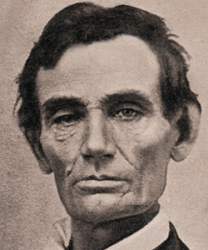Record Data
Transcription
Dr. Theodore Canisius Springfield, May 17, 1859
Dear Sir: Your note asking, in behalf of yourself and other german citizens, whether I am for or against the constitutional provision in regard to naturalized citizens, lately adopted by Massachusetts; and whether I am for or against a fusion of the republicans, and other opposition elements, for the canvass of 1860, is received.
Massachusetts is a sovereign and independent state; and it is no privilege of mine to scold her for what she does. Still, if from what she has done, an inference is sought to be drawn as to what I would do, I may, without impropriety, speak out. I say then, that, as I understand the Massachusetts provision, I am against it's adoption in Illinois, or in any other place, where I have a right to oppose it. Understanding the spirit of our institutions to aim at the elevation of men, I am opposed to whatever tends to degrade them. I have some little notoriety for commiserating the oppressed condition of the negro; and I should be strangely inconsistent if I could favor any project for curtailing the existing rights of white men, even though born in different lands, and speaking different languages from myself.
As to the matter of fusion, I am for it, if it can be had on republican grounds; and I am not for it on any other terms. A fusion on any other terms, would be as foolish as unprincipled. It would lose the whole North, while the common enemy would still carry the whole South. The question of men is a different one. There are good patriotic men, and able statesmen, in the South whom I would cheerfully support, if they would now place themselves on republican ground. But I am against letting down the republican standard a hair's breadth.
I have written this hastily, but I believe it answers your questions substantially. Yours truly A. LINCOLN


